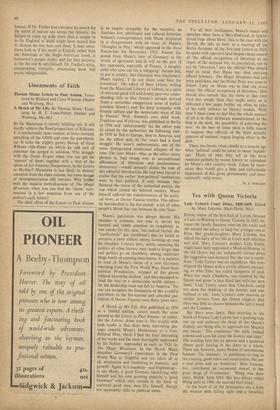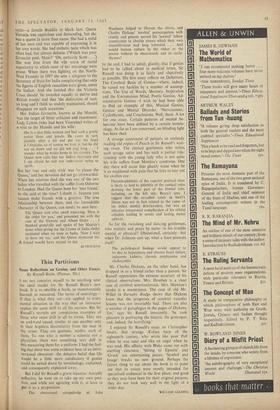Tea with Queen Victoria
Lady Lytton's Court Diary, 1895-1899. Edited by Mary Lutycns. (Hart-Davis, 30s.) EDITH, widow of the first Earl of Lytton, became a Lady-in-Waiting to Queen Victoria in 1895, be- cause the family finances were on the rocks and she needed the salary to keep her younger son at Eton. Her grand-daughter, Mary Lutycns, has edited the diary of her life at Court with affection and skill. Mary Lutyens's mother, Lady Emily, might have been appointed a Maid-of-Honour to the old Queen, but she 'indignantly turned down the suggestion and declared that she was a repub- lican.' Lady Lytton was no republican. She wor- shipped the Queen with a servile silliness amount- ing to what Eliot has called dampness of soul. When her maid, Checketts, was received by the Queen and given 'a nice fitted box with her own hand,' Lady Lytton notes that 'Checketts could not sleep for thinking of the honour and was inclined to cry.' Lady Lytton's own reaction to similar favours from the Queen suggests that there was little to choose between the lady's maid and the Countess.
But there were limits. One morning in the South of France Lady Lytton 'saw a gushing lady run up and embrace the head of the Queen's donkey, not being able to approach her Majesty any nearer.' The coachman,' she adds, 'looked solemn and soon 1Cd away the donkey and chair.' The wording here has an aptness and a quizzical charm quite lacking in the diary as a whole. There are, however, many flashes of unconscious humour—for instance: 'A gentleman to sing in the evening, good voice and enunciation, but not a true artist and an American.' Miss Lutycns, too, contributes an occasional morsel to the great heap of U-nonsense: 'Wang was their sister, Mabel, born 1884. She was always called Wang until in 1906 she married Earl Grey.'
At the heart of all the fatuousness sits a little old woman with failing sight and a beautiful
smile—a female Buddha in black lace. Queen Victoria was capricious and demanding, but she was a queen in more than name. She had a mind of her own and was capable of expressing it in her own words. She had msthetic taste which was often bad, but always definite. ('Which was your favourite poet, Mam?"0h, certainly Scott . . She was free from the vile sense of racial superiority to which most of her entourage were Prone. When there was fighting on the North- West Frontier in 1897 she sent a telegram to the Secretary of State for India complaining that only the figures of English casualties were given, never the Indian. And she insisted that the Victoria Cross should 'be awarded equally to native and British troops' and that 'the distinction of race, so long and I think so unduly maintained, should disappear on such occasions.'
Her Indian favourite, known as the Munshi, was the target of bitter criticism and resentment. Lady Lytton (who had been Vicereine) writes of a visit to the Munshi and his wife:
She is a nice little woman and had such a pretty native dress and jewels. He came in very jauntily after a bit and put out his hand a l'Anglaise, so of course we took it, but he did not sit down and we did not stay long . . . I wonder what he writes home to his country. The Queen now calls him her Indian Secretary and I am afraid he will not understand being so spoilt.
But her 'one and only wish' was `to please the Queen,' and her devotion did not go unrewarded. When her mistress died she was one of the two ladies who travelled with the coffin from Osborne to London. Had the Queen been her 'best friend,' as she said at the time? I doubt it, because you cannot make friends with a goddess. The true relationship between them, and the formidable character of the Queen, can surely be seen here: The Queen said after small topicking, 'Here is the order for you,' and presented me with the case of the Victoria and Albert Order . . . I thanked gratefully and spoke of her Majesty's letter when giving me the Crown of India Order instituted when we were in India. 'Now I wish to have my tea,' and the Queen dismissed mc.
A friend would have stayed to tea.
ALTRINCH AM



































 Previous page
Previous page